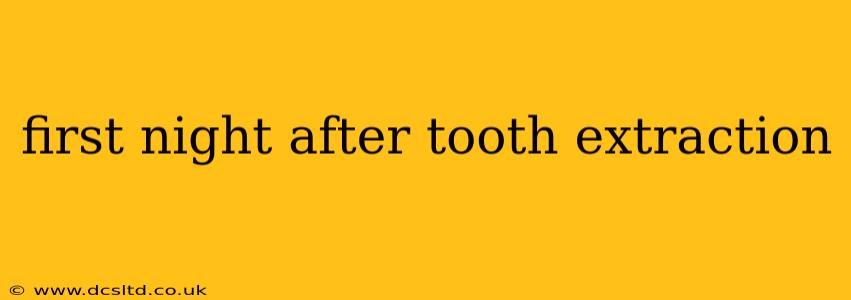The first night after a tooth extraction can be challenging, marked by discomfort, swelling, and potentially some bleeding. Understanding what to expect and taking proactive steps can significantly improve your experience and promote faster healing. This comprehensive guide addresses common concerns and provides practical advice to help you navigate your first post-extraction night comfortably.
What Happens During the First Night After Tooth Extraction?
Immediately following the procedure, you'll likely experience some pain and bleeding. Your dentist or oral surgeon will have provided you with detailed post-operative instructions, including pain medication and ways to manage bleeding. The most important thing is to follow these instructions carefully. During the night, you might experience increased swelling as your body responds to the extraction site. This is a normal part of the healing process. You might also wake up with a slightly stiff jaw, making opening your mouth fully difficult.
How Much Pain Should I Expect?
The level of pain varies from person to person. Some individuals experience minimal discomfort, while others report moderate to severe pain. Your dentist will prescribe pain medication to manage this. It's crucial to take the medication as directed, even if the pain seems manageable. This prevents the pain from escalating, making it easier to manage. Don't hesitate to contact your dentist if the pain is unmanageable despite medication.
How Can I Manage Pain and Swelling?
Managing Pain: Follow your dentist's instructions regarding pain medication. Over-the-counter pain relievers like ibuprofen can be helpful, but always check with your dentist before taking any additional medications. Applying ice packs to the affected area for 15-20 minutes at a time, several times a day, can significantly reduce swelling and pain.
Managing Swelling: Ice packs are your best friend in the first 24-48 hours. After 48 hours, you can switch to warm compresses to promote blood flow and further reduce swelling. Elevating your head with extra pillows while sleeping can also help minimize swelling.
What Should I Eat and Drink?
Nourishment is crucial for healing, but it's essential to stick to a soft food diet during the first few days. Avoid anything that requires chewing vigorously. Suitable options include:
- Soups: Broth-based soups are gentle on the extraction site.
- Yogurt: Provides protein and calcium for healing.
- Applesauce: A good source of nutrients.
- Mashed potatoes: Easy to swallow and digest.
- Scrambled eggs: Protein-rich and easy to eat.
Avoid using straws, as suction can dislodge the blood clot forming in the socket, potentially leading to a painful complication called dry socket. Drink plenty of fluids, but avoid hot drinks, as they can irritate the extraction site.
When Should I Call My Dentist?
Contact your dentist immediately if you experience:
- Excessive bleeding: Bleeding that soaks through gauze pads continuously after an hour or more.
- Severe pain that's not controlled by medication.
- Signs of infection: Increased pain, swelling, fever, or pus.
- Dry socket: Severe, throbbing pain, often starting 2-3 days after the extraction.
How Long Will It Take to Heal?
Complete healing time varies depending on several factors, including the complexity of the extraction and individual healing abilities. However, most individuals experience significant improvement within the first week, with full healing taking several weeks or even months.
Can I Smoke or Drink Alcohol After Tooth Extraction?
Both smoking and alcohol consumption should be avoided in the days following a tooth extraction. Smoking can significantly hinder healing, increasing the risk of dry socket and infection. Alcohol can thin the blood, potentially leading to increased bleeding.
What Position Should I Sleep In?
Sleeping with your head elevated on an extra pillow can help reduce swelling and discomfort. Avoid sleeping directly on the affected side.
What are the Signs of Infection After Tooth Extraction?
Signs of infection include increased pain and swelling, fever, bad breath, and pus around the extraction site. If you experience any of these symptoms, contact your dentist immediately.
By following these guidelines, you can navigate your first night after tooth extraction with greater comfort and support your body's natural healing process. Remember that every individual heals at a different pace, so be patient and listen to your body. If you have any concerns, don't hesitate to contact your dentist.
